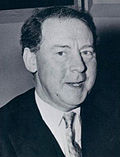Background
Following the heavy defeat of the Labour Party in the 1959 general election, its leader Hugh Gaitskell had determined that the party must change fundamentally to make itself electable. He decided to attempt to rewrite Clause IV of the party constitution, which appeared to commit it to nationalisation of every industry. [1] However his move provoked firm opposition from the major unions and the left-wing of the party, and facing certain defeat, he withdrew it in March 1960. [2] In the meantime the Government's decision to abandon the British Blue Streak missile and buy instead the US Skybolt system had made nuclear weapons a prominent political issue. Gaitskell supported the decision to buy an American system and to remain in NATO, a policy stance which outraged the left. [3] At the party conference in Scarborough in October 1960, motions calling for unilateral nuclear disarmament were carried despite Gaitskell's speech declaring that he and his allies would "fight and fight and fight again to save the Party we love". [4]
Elections for the Leader and Deputy Leader were formally held by the Parliamentary Labour Party at the beginning of each Parliamentary session, which happened later in October. There was already a vacancy for the Deputy Leader of the Party due to the death of Aneurin Bevan in July, and many senior party figures were weighing up whether to stand for that post; contested elections for vacant posts were usual, but incumbents were not normally challenged. The result of the faction-fighting was that many on the left thought Gaitskell was both out of touch with the party and that a challenge might force him to the left, so they were keen to have a credible challenger. [5] One left candidate who was keen to fight for the deputy leadership was Harold Wilson, who found himself subjected to pressure to challenge Gaitskell instead. Peter Shore, then head of the Research Department at party headquarters, thought Gaitskell had lost the confidence of party staff and Wilson could restore it. Jennie Lee, Bevan's widow and a fellow Labour MP, led a delegation to Wilson. [6]
Wilson resisted but his hand was forced when Anthony Greenwood resigned from the Shadow Cabinet saying he would not serve under Gaitskell while he defied conference decisions. Greenwood then announced his candidature for leader but said he would stand aside in favour of someone with "broader" appeal, by which he meant Wilson. Wilson knew that the leadership challenge would not succeed but thought he stood a good chance of winning the deputy leadership; what changed his mind was the fear that he would lose the mantle of the left-wing standard bearer should he not stand. [7] He was also still furious with Gaitskell over a failed attempt to move him from the post of Shadow Chancellor of the Exchequer the previous year. [8] Although Wilson was aligned to the left, he was not a supporter of unilateralism; in standing for the leadership he said the issue was "unity versus civil war". [9]
This page is based on this
Wikipedia article Text is available under the
CC BY-SA 4.0 license; additional terms may apply.
Images, videos and audio are available under their respective licenses.




